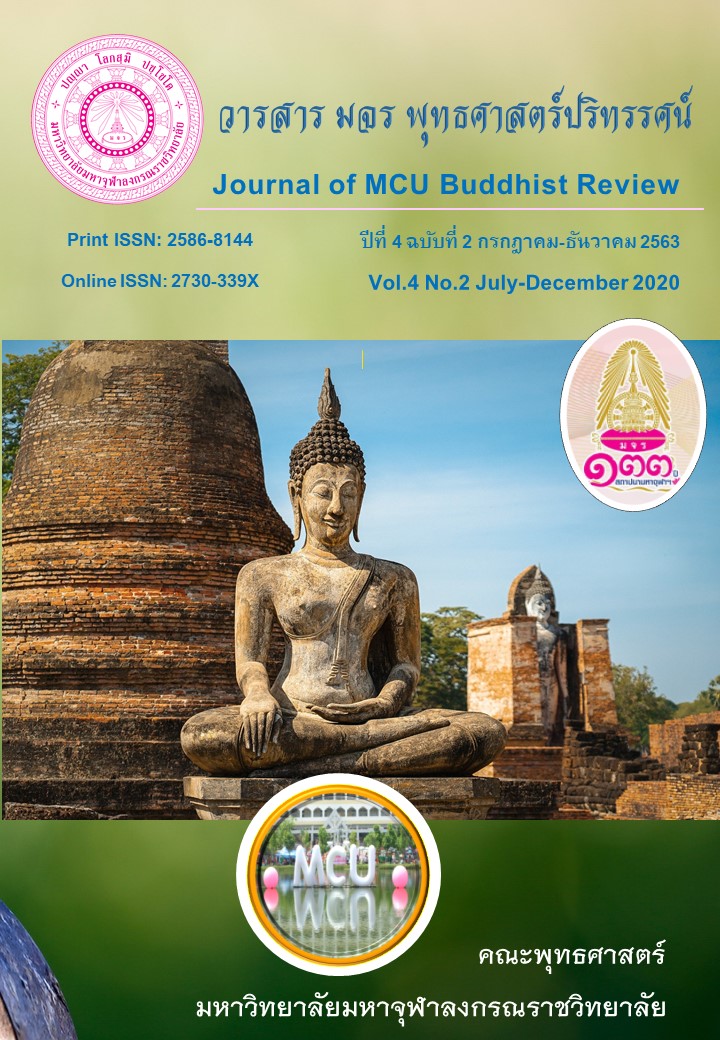ศึกษาวิเคราะห์เรื่องศีลกับการทำธุรกิจในพระพุทธศาสนาเถรวาท
Main Article Content
บทคัดย่อ
บทความนี้ มีวัตถุประสงค์ 2 ประการ เพื่อศึกษาความหมายศีล และเพื่อวิเคราะห์ศึกษาเรื่องศีลกับการทำธุรกิจในพระพุทธศาสนาเถรวาท การศึกษานี้เป็นการศึกษาเชิงคุณภาพเน้นเอกสาร ผลการศึกษาพบว่า ศีล จำเป็นต่อการดำเนินชีวิต ทั้งของตนและคนหมู่มาก เป็นการฝึกฝนขัดเกลา พฤติกรรม เพื่อสร้างเสริมสภาพชีวิตให้สอดคล้องสัมพันธ์กับสิ่งแวดล้อมทางสังคม เป็นไปด้วยดี
การวิเคราะห์ศีลกับการทำธุรกิจในพระพุทธศาสนาเถรวาท พบว่า การทำธุรกิจจึงเกี่ยวข้องกับปัจเจกบุคคลกับสังคมกล่าวคือ ในแง่ของปัจเจกบุคคลนั้นถือว่า การมีศีลธรรมพื้นฐานคือศีล 5 ถือว่าเป็นหลักปฏิบัติเบื้องต้นในการกำหนดกฎกติกาในการอยู่ร่วมกัน โดยหลักการพื้นฐานดังกล่าวนี้จะต้องสะท้อนให้เห็นความยุติธรรมที่เกิดขึ้นและสร้างความมั่งคั่งให้เกิดขึ้นกับทุกชีวิตในสังคม ขณะที่การพิจารณาศีลในฐานะการสร้างชีวิตและสังคมที่ดีกับการทำธุรกิจนั้น มุ่งเน้นไปที่สังคมที่จะต้องมีการออกแบบให้ผู้นำหรือผู้บริหารใช้ธุรกิจเพื่อเป็นเครื่องมือในการไปสู่เป้าหมาย โดยไม่ได้เน้นแค่วัตถุอันเกิดจากการกินดีอยู่ดีเท่านั้น แต่ต้องมุ่งไปถึงจิตใจเป็นหลัก
Article Details
- บทความที่ได้รับการตีพิมพ์เป็นลิขสิทธิ์ของวารสาร มจร พุทธศาสตร์ปริทรรศน์
- ข้อความใดๆ ที่ปรากฎในบทความที่ได้รับการตีพิมพ์ในวารสาร ถือเป็นความรับผิดชอบของผู้เขียนบทความ และข้อคิดเห็นนั้นไม่ถือว่าเป็นทัศนะและความรับผิดชอบของกองบรรณาธิการวารสาร มจร พุทธศาสตร์ปริทรรศน์
เอกสารอ้างอิง
กรมศาสนา กระทรงศึกษาธิการ. (2550). พระไตรปิฏกภาษาไทย ฉบับหลวง เล่มที่ 26. พิมพ์ครั้งที่ 2. ในการฉลองรัชดาภิเษกพระบาทสมเด็จพระเจ้าอยู่หัวรัชกาลที่ 9. กรุงเทพมหานคร : โรงพิมพ์กรมการศาสนา.
คิชเทนี ไนล์. (2562). เศรษฐศาสตร์: ประวัติศาสตร์มีชีวิตของพัฒนาการความคิดเศรษฐศาสตร์. แปลโดย ฐณฐ จินดานนท์. กรุงเทพมหานคร: บุ๊คสเคป.
ชัยวัฒน์ อัมพัฒน์. (2523). หลักพุทธศาสนา. กรุงเทพมหานคร: บริษัท เอส.เอ็ม.เอ็ม.จำกัด.เซน อมาตยา. (2562). จริยเศรษฐศาสตร์. แปลโดย สฤณี อาชวานันทกุล. กรุงเทพมหานคร: ซอลท์ พับลิชชิ่ง.
พระเทพเวที (ประยุทธ์ ปยุตโต). (2532). พจนานุกรมพุทธศาสตร์ ฉบับประมวลธรรม. กรุงเทพมหานคร: โรงพิพม์มหาจุฬาลงกรณ์ราชวิทยาลัย.
สมเด็จพระญาณสังวร สมเด็จพระสังฆราช. (2538). ความจริงที่ต้องเข้าใจ. กรุงเทพมหานคร: โรงพิมพ์มหามงกุฎราชวิทยาลัย.
ธนิต อยู่โพธิ์. (2540). อานิสงส์ศีล 5. กรุงเทพมหานคร: โรงพิมพ์มหาจุฬาลงกรณราชวิทยาลัย.
พุทธทาสภิกขุ. (2540). ทาน ศีล ภาวนา. กรุงเทพมหานคร: สำนักพิมพ์สุขภาพใจ.
พระพุทธโฆษาจารย์. (2554). คัมภีร์วิสุทธิมรรค. แปลและเรียบเรียง สมเด็จพระพุฒาจารย์ (อาจ อาสภมหาเถร). พิมพ์ครั้งที่ 10. กรุงเทพมหานคร: โรงพิมพ์ธนาเพรส.
มหาจุฬาลงกรณราชวิทยาลัย.(2535). พระไตรปิฏกภาษาไทย ฉบับมหาจุฬาลงกรณราช
วิทยาลัย. กรุงเทพมหานคร: โรงพิมพ์มหาจุฬาลงกรราชวิทยาลัย.
Bowen, H. (1953). Social Responsibilities of the Businessman. New York: Harper.
David J. Kalupahana. (2008). Ethics in Early Buddhism. Delhi: Motilal Banarsidass.
Peter Harvey. (2000). An Introduction to Buddhist Ethics. New York: Cambridge University Press.
Todd Lowry. (2003). "Ancient and Medieval Economics". A Companion to the History of Economic Thought. Edited by WARREN J. SAMUELS, JEFF E. BIDDLE and JOHN B. DAVIS.Oxford: Blackwell Publishing
Ltd.
Freeman, E. (1984). Strategic Management: A Stakeholder Approach. Boston: Pitman.
Berle, A. and Means, G. (1932). Private Property and the Modern Corporation. New York: Commerce Clearing House.


